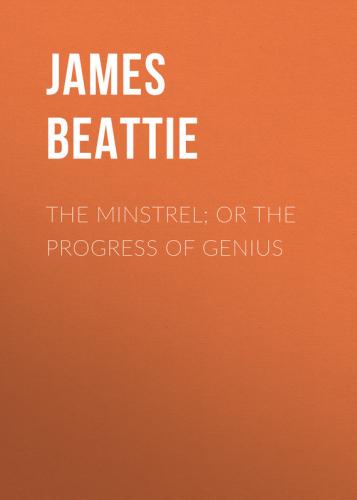E’er win its way to thy corrupted heart;
For ah! it poisons like a scorpion’s dart;
Prompting the ungenerous wish, the selfish scheme,
The stern resolve, unmoved by pity’s smart,
The troublous day, and long distressful dream.
Return, my roving Muse! resume thy purposed theme.
There lived, in Gothic days, as legends tell,
A shepherd-swain, a man of low degree;
Whose sires, perchance, in Fairyland might dwell,
Sicilian groves, or vales of Arcady;
But he, I ween, was of the North Countrie:
A nation famed for song, and beauty’s charms;
Zealous, yet modest; innocent, though free;
Patient of toil; serene amidst alarms;
Inflexible in faith; invincible in arms.
The shepherd-swain, of whom I mention made,
On Scotia’s mountains fed his little flock;
The sickle, scythe, or plough, he never swayed;
An honest heart was almost all his stock;
His drink the living water from the rock:
The milky dams supplied his board, and lent
Their kindly fleece to baffle winter’s shock;
And he, though oft with dust and sweat besprent,
Did guide and guard their wanderings, wheresoe’er they went.
From labour health, from health contentment springs.
Contentment opes the source of every joy.
He envied not, he never thought of kings;
Nor from those appetites sustained annoy,
Which chance may frustrate, or indulgence cloy:
Nor fate his calm and humble hopes beguiled;
He mourned no recreant friend, nor mistress coy,
For on his vows the blameless Phœbe smiled,
And her alone he loved, and loved her from a child.
No jealousy their dawn of love o’ercast,
Nor blasted were their wedded days with strife;
Each season looked delightful, as it past,
To the fond husband, and the faithful wife.
Beyond the lowly vale of shepherd life
They never roamed; secure beneath the storm
Which in Ambition’s lofty land is rife,
Where peace and love are cankered by the worm
Of pride, each bud of joy industrious to deform.
The wight, whose tale these artless lines unfold,
Was all the offspring of this simple pair.
His birth no oracle or seer foretold:
No prodigy appeared in earth or air,
Nor aught that might a strange event declare.
You guess each circumstance of Edwin’s birth;
The parent’s transport, and the parent’s care;
The gossip’s prayer for wealth, and wit, and worth;
And one long summer-day of indolence and mirth.
And yet poor Edwin was no vulgar boy;
Deep thought oft seemed to fix his infant eye.
Dainties he heeded not, nor gaude, nor toy,
Save one short pipe of rudest minstrelsy.
Silent when glad; affectionate, though shy;
And now his look was most demurely sad,
And now he laughed aloud, yet none knew why.
The neighbours stared and sighed, yet blessed the lad:
Some deemed him wondrous wise, and some believed him mad.
But why should I his childish feats display?
Concourse, and noise, and toil, he ever fled;
Nor cared to mingle in the clamorous fray
Of squabbling imps; but to the forest sped,
Or roamed at large the lonely mountain’s head;
Or, where the maze of some bewildered stream
To deep untrodden groves his footsteps led,
There would he wander wild, ’till Phœbus’ beam,
Shot from the western cliff, released the weary team.
The exploit of strength, dexterity, or speed,
To him nor vanity nor joy could bring.
His heart, from cruel sport estranged, would bleed
To work the woe of any living thing,
By trap, or net; by arrow, or by sling;
These he detested, those he scorned to wield:
He wished to be the guardian, not the king,
Tyrant, far less, or traitor, of the field.
And sure the sylvan reign unbloody joy might yield.
Lo! where the stripling, wrapt in wonder, roves
Beneath the precipice o’erhung with pine;
And sees, on high, amidst the encircling groves,
From cliff to cliff the foaming torrents shine:
While waters, woods, and winds, in concert join,
And Echo swells the chorus to the skies.
Would Edwin this majestic scene resign
For aught the huntsman’s puny craft supplies?
Ah! no: he better knows great Nature’s charms to prize.
And oft he traced the uplands, to survey,
When o’er the sky advanced the kindling dawn,
The crimson cloud, blue main, and mountain grey,
And lake, dim-gleaming on the smoky lawn;
Far to the west the long, long vale withdrawn,
Where twilight loves to linger for a while;
And now he faintly kens the bounding fawn,
And villager abroad at early toil.
But, lo! the sun appears! and heaven, earth, ocean, smile.
And oft the craggy cliff he loved to climb,
When all in mist the world below was lost.
What dreadful pleasure! there to stand sublime,
Like shipwrecked mariner on desert coast,
And view the enormous waste of vapour, tost
In billows, lengthening to the horizon round,
Now scooped in gulfs, with mountains now embossed!
And hear the voice of mirth and song rebound,
Flocks, herds, and waterfalls, along the hoar profound!
In truth
